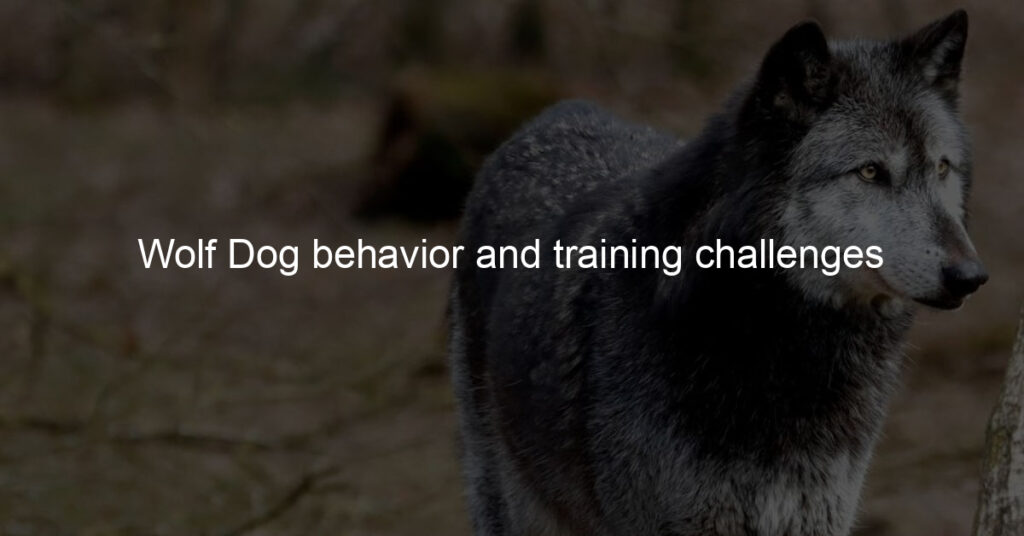If you’re a fan of the majestic wolf dog breed, then you know that raising and training these loyal creatures can be both an exciting endeavor and one full of challenges. Wolf dogs are part wild animals, which means they carry some of the behavior traits that their ancestors passed down – behaviors like their wild wariness, or a desire for freedom. They are also highly intelligent and some people even say they’re trainable! But regardless of how intelligent and passionate your pup is, raising them presents its own set of difficulties.
What are the behaviors of wolf dogs?
Wolf dogs, also known as wolf hybrids, are fascinating creatures. These canines possess unique behaviors that many of us may not be aware of. They are typically very intelligent animals, excelling at problem-solving and outmaneuvering the average dog.
They often enjoy being active and independent, needing a consistent level of psychological stimulation to stay happy and healthy. A wolf dog’s diet should be full of quality proteins and vegetables to properly nourish them as they’re growing. Socialization, it’s essential for these animals because wolves tend to be more dominant than most breeds when maturing.
It’s important to offer gentle guidance when interacting with a wolf-dog to ensure that proper behavior is maintained or encouraged over time. They can make wonderful companions if taken care of properly!
Can wolf dogs be trained?
It is possible to train wolf dogs, although with extra caution and understanding, as they can behave differently from purely domestic breeds. Wolf dogs, which are typically a hybrid between a wolf and a domesticated canine, have the potential to possess traits of both the wild ancestor and regular house dog.
Therefore, basic commands may not suffice – instead, having an in-depth knowledge of how wolves think and act is crucial to properly understanding how to express your desires to your wolf dog through positive reinforcement. With enough care, observation, and patience any wolf dog can be trained just like any other domesticated canine.
How is Wolf Dog behavior different from dog behavior?
Wolf dogs’ behavior is often a subject of fascination due to the differences between their instincts and traits compared to those of domestic dogs. Generally, in comparison, Wolf Dogs retain more intense predatory drives. This can lead them to have higher levels of physical activity than regular domestic dogs and greater chasing and hunting behaviors.
Moreover, wolf-dog crosses typically require much more socialization beginning from a young age compared to other breeds of domesticated dogs as they strive for a hierarchical structure. Additionally, the pack mentality of wolves means that these animals may need more companionship than those built into their environment given by humans. Altogether, these intriguing differences in behaviors make Wolf Dogs both exciting yet demanding companion animals.
What are Wolf Dog behaviors?
Wolf Dogs are incredibly enchanting creatures, but they aren’t your typical canine companion. These dogs have a hybrid ancestry and are often crossed with an Alaskan Malamute or Gray Wolf.
As such, it’s important to view them as their critter entirely. Unique behaviors of Wolf Dogs typically include nonstop energy, strong instincts, and the need for regular exercise and stimulation. Socialization is also important for these hybrids to prevent dominance issues when around other animals or humans.
When trained properly, Wolf Dogs can make excellent house pets due to their lovable hearts. With the adequate attention and care that these independent animals crave, they just might be the perfect addition to your home!
How easy is it to train a Wolf Dog?
Training a Wolf Dog can be quite challenging, as they are diverse animals that can have fluctuating behavior patterns. Wolf Dogs require an experienced and confident hand, as their enhanced intelligence can lead to the development of complex behaviors. Regular walks and spending time in stimulating environments will help keep your Wolf Dog’s mind engaged, but patience is the key to successful training.
Instead of relying on punishments to correct mistakes, positive reinforcement should be used instead — rewarding them for good behavior and praising them when they’re correct. While it may take more time and dedication than other breeds, with commitment and care it’s certainly possible to train Wolf Dogs effectively!
How do you get a Wolf Dog to respect you?
Wolf dogs are unique animals that need special attention and training. They respond very well to positive reinforcement and can quickly recognize when a trainer is in charge.
To ensure that your wolf dog respects you, start by showing that your commands are important. When giving it instructions, do so calmly but firmly. Follow up with treats or praise when the instruction has been followed successfully. It is key to be consistent with the commands and how you react to any misbehavior. If a wolf dog senses that their master is wavering, it may become anxious and test the boundaries.
This can lead to further issues down the road if not corrected at an early stage by reinforcing desirable behavior and properly disciplining undesirable behavior. With patience and consistency, owners should soon find their wolf dogs responding positively to commands, which will make everyone feel safer and more secure in their environment!
Conclusion
Wolf dogs may be beautiful and majestic, but they aren’t for everyone. They require a lot of exercise, patience, and consistency in training to thrive. Training and socialization are key to ensuring these furry companions have their best life possible. If you’re up for the challenge though, owning a wolf dog can be an incredibly rewarding experience – both physically and emotionally. With patience and dedication, owners can truly create an unbreakable bond with their canine counterparts. In the end, wolf-dog ownership isn’t necessarily an easy commitment. But if done right it may just be worth your while!








